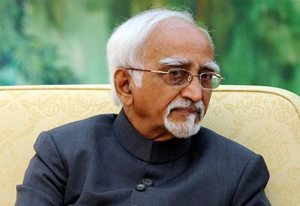New Delhi, Sep 7: Hitting back at the Vishwa Hindu Parishad (VHP) over its criticism of Vice President Hamid Ansari, leaders of some Muslim outfits said on Wednesday it only reflects its "communal mindset" and lack of respect for Indian Constitution.
The leaders defended Mr Ansari over his remarks on the need for "affirmative action" to help the Muslim community, saying the statement was "very much" within the framework of Government policies.
"The kind of people they are...the whole country knows how much they respect Indian Constitution and what are their feelings for minorities. Such a reaction from VHP is not unexpected, only reflects their communal mindset. They do not have a large enough heart to accept Muslims as equal citizens. And, at the same time, they are also not respecting Constitutional post of the Vice President," Mohammad Salim Engineer, secretary general, Jamaat-E-Islami Hind, reacted.
President of Welfare Party of India, SQR Ilyas, echoed similar sentiments and termed VHP's response as "uncalled for". Mr Ilyas insisted Mr Ansari's statements were within framework of the Constitution and Government's policies.
"He (Ansari) clearly said that 'sabka sath, sabka vikas' (campaign) should also include Muslims. Whoever is the President or Vice President...if he is invited to a Muslim organisation's event where he says Muslims will also get benefit of Government policies, what is wrong in it? How does this suggest Ansari went against his Constitutional post?" Mr Ilyas, also general secretary of All India Muslim Majlis-e-Mushawarat (AIMMM), asked.
Speaking at the golden jubilee function of AIMMM - top body of Muslim outfits - in New Delhi on August 31, Mr Ansari had noted identity and security, education and empowerment and fair share in decision making as the principal problems confronting India's Muslims.
He had stated the default in terms of exclusion and discrimination has to be corrected by state.
The VHP, however, took strong objection to the remarks dubbing them as "communal" and said the statements did not befit dignity of Vice President's office. It also insisted Mr Ansari to either apologise or resign.
The Hindutva outfit also said such a demand seeks to "push Muslims in dark alleys of dissatisfaction whose consequences will be dangerous".





Comments
Add new comment